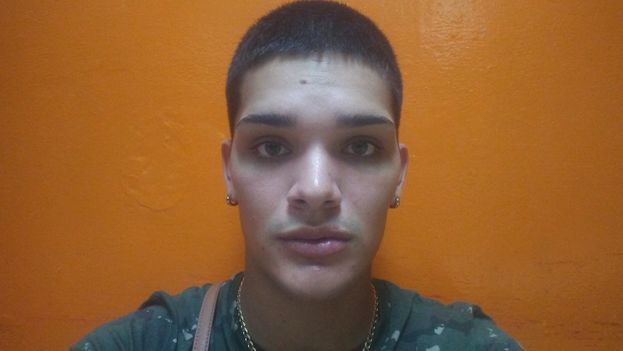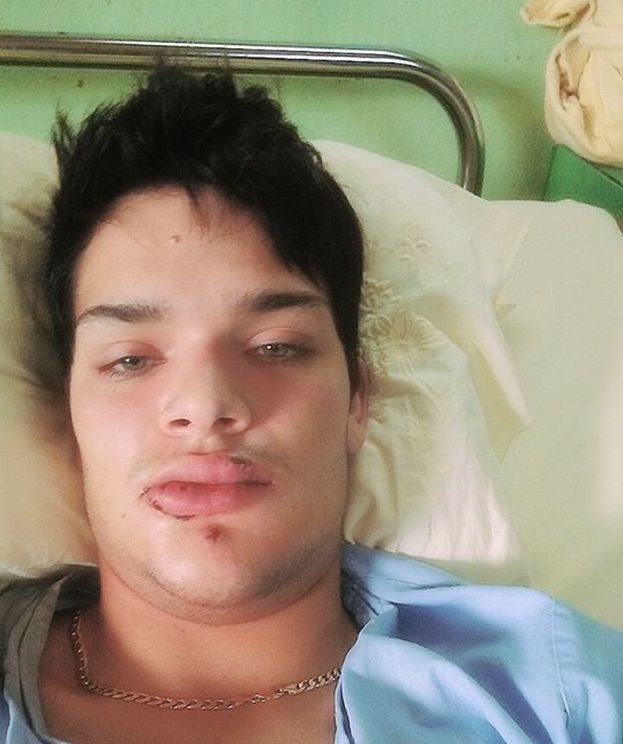
![]() 14ymedio, Luz Escobar, 13 November 2017 – It was a warm night in June and José Enrique Morales Besada was connected to the internet at a Wi-Fi hotspot in Morón, Ciego de Ávila. On returning home, his life took a dramatic turn when he was a victim of a homophobic attack that left him with serious physical consequences and a desire for justice that current Cuban legislation has failed to satisfy.
14ymedio, Luz Escobar, 13 November 2017 – It was a warm night in June and José Enrique Morales Besada was connected to the internet at a Wi-Fi hotspot in Morón, Ciego de Ávila. On returning home, his life took a dramatic turn when he was a victim of a homophobic attack that left him with serious physical consequences and a desire for justice that current Cuban legislation has failed to satisfy.
Last Friday, the Prosecutor’s Office decided to close the criminal process for his case and settle it with the imposition of a fine on his attackers. The interest in the attack on the part of the National Center for Sex Education (Cenesex), led by Raul Castro’s daughter Mariela Castro, has not been enough to bring his assailants to trial, although it did speed up the police investigation.
At just 21, this young man has spent the last months shuttling between medical consultations and police appointments after two men insulted him and hit him on the side of his face with a bottle. José Enrique only remembers lying on the floor, with a friend by his side who was screaming for help, he tells 14ymedio by phone.
Morales Besada dreamed of becoming a professional singer. He performed at parties and tourist facilities, offering pop themes, ballads, classics in English and popular dance music, but now he can barely finish a sentence without speech problems that stop him in the middle of his words.
“Every time I speak I have a very strange feeling, so I can’t sing because I can’t modulate my voice well,” he laments. The blow caused him to lose several teeth, destroyed part of his gums and caused a serious fracture of the jaw for which he had to undergo surgery.
Four years before the attack, the streets of Morón were filled with colorful displays when the province became the site for the Day Against Homophobia. The annual vindication has not succeeded in banishing the prejudices that remain deeply rooted in that region and in the rest of the country.
For Morales Besada, the Ciego de Ávila LGBTI community faces a “dark panorama” and its members suffer constant aggravations in the streets as well as “degrading treatment.”
“It is very difficult to sit in a park without someone passing by and throwing an insult or a can of beer,” he complains.
Homophobia in Cuba also enjoys police complicity. “When somebody goes to file a complaint about something like that they treat them like they’re crazy,” declares the young man, who, in spite of appearing with witnesses before the authorities, barely managed that his attackers spent 24 hours in custody. “They left after paying a bond of 1,000 Cuban pesos (roughly $40 US) each.”
The Cuban Penal Code does not include the concept of “hate crimes” regarding attacks against people based on ethnic origin, religion, race, gender, sexual orientation and identity. The latter, specifically, are not included in the current legislation and attacks against them are treated by the police and the courts like any other crime.
A few days after the attack, the singer wrote in his Facebook account an initial message saying what happened, demanding justice and asking Mariela Castro directly for help.

In 2015, Mariela Castro had assured in a public event that the institution she directs was working in collaboration with the Ministry of the Interior to closely monitor these aggressions. “A thorough and specialized analysis is needed to determine the type of crime because all situations where LGBTI people are victims do not have hatred as a motive,” said the sexologist.
Cenesex began to investigate what happened in Morón and sent a letter to the municipality’s National Revolutionary Police (PNR). Morales Besada admits that when the officers heard the name of the daughter of the Cuban leader “they started running around and wanted to do in a day what they should have done from the beginning.”
The 10th was when Morales Besada knew that there would never be a trial for his attackers. The Prosecutor’s Office dismissed the opening of the trial and has settled the case with a fine against both perpetrators. After hearing the conclusion from the investigator, the young man came out crying. He did not even want to sign the official communication.
Morales Besada denounces multiple irregularities in the process. “Nobody from the investigation visited my maxillofacial doctor to ask what my current state of health is,” he complains. In addition, the report that was prepared in the hospital recording the facial and mouth injuries he suffered was “conveniently” lost and only appeared, after much searching, detailing cervical injuries.
“No trial was held and they deceived me because until that moment they had told me that they would be taken to court.”
Members of the Cuban LGBTI community have collected more and more records of assaults and hate crimes. Although official institutions do not publish statistics on murders or violent acts against lesbian, gay, bisexual, transgender and intersex people, the news now is made known thanks to social networks.
In May 2015, this newspaper published an article about the stoning death of a 24-year-old transsexual in the city of Pinar del Río. The official media never published the news.
Morales Besada, who feels deceived and refuses to let the perpetrators go unpunished “as if nothing happened,” published a Facebook message last Friday that has made his case known to thousands of internet users.
The young man claims that both attackers have a history of homophobic violence. “They beat another boy who works in the Cayo but he did not accuse them because he is afraid.”
“This attack has left me without a life,” says José Enrique. The physical damage can leave permanent affects, but what adds to the pain now is the impotence he feels in the absence of justice.
